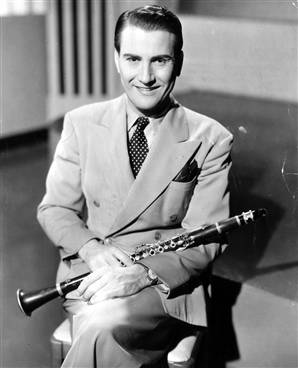
He roomed with both Bix Beiderbecke and Bunny Berigan, he hired Billie Holiday to sing with his band and at least by his own account he turned down Charlie Parkers bid to join his saxophone section. (I said, Bird, you couldn't play in my band, you're too much of an individualist! ) Superficially, Shaw couldn't have been less like these doom-bound drunks and drug addicts.
In Three Chords for Beauty's Sake, Tom Nolan's absorbing if somewhat sketchy new biography, we see him drunk exactly once when he was in his teens and a prankish band mate fed him shots of rye with beer chasers and once, at about 20, half-stoned on weed with Berigan.
Thanks to clean living, good luck and, surely, a measure of cussedness, Shaw lived to be 94 and died, in 2004, the way Robert Frost recommended: Better to go down dignified / With boughten friendship at your side / Than none at all. Provide, provide! He even kept his sense of humor, or at least his memory of an old Myron Cohen joke.
His personal assistant (who stayed with him for 11 years, sometimes by dint of repeating the word mortgage to himself) and his home-hospice caregiver were changing the old mans bedclothes during his last days and asked if he was comfortable. I make a living, he said. He did, too. Though Nolan's book doesn't say so, Shaw's estate was probably worth around $3 million, and he hadn't played on a record for half a century.
Yet Three Chords for Beauty's Sake is as grimly fascinating as any story of a young flameout dying in the gutter. Shaw spent his first 44 years acquiring artistic mastery Ray Charles called him one of the greatest musicians that ever lived as well as money, fame and an array of Americas choicest sexual trophies.
How good was he? Let him tell you.
A musician he identified only as a well-known clarinet player once asked if he was ever afraid he'd miss that fiendish altissimo high C that ended his showpiece Concerto for Clarinet, always the climax of his live sets. I said, Put your hand on the table. He did, and I said, Raise your index finger. He did. I said, Were you afraid you'd miss? Well, no, he said, and then, You mean, its like that? If it isn't, I said, don't mess with it.
And then, at the height of his powers, Shaw stopped playing the clarinet, walked away from the music business and spent the next 50 years busying himself with dairy farming, marksmanship, movie distribution, writing a never-to-be-finished autobiographical novel anything except what he seemed put on earth to do. And wondering what his life had been about.
His ultimate pastime was telling and retelling his stories, both in private and in public. And he told them wonderfully, said the writer Aram Saroyan, whose novelist father, William, had been a friend of Shaw's. It was almost like what replaced music, for him. He was always the central figure. . . . And the attitude in the stories was the same, from beginning to end: I'm a gifted supremely gifted human being; and . . . the world has endeavored to drive me crazy. . . . The stories are great; they're fascinating. And then every so often . . . hes a little appalling. Actually, thanks to psychoanalysis, Shaw had attained a bit more self-knowledge than that (it was his fathers disapproval, or maybe his mothers clinging, that had driven him crazy), but those insights didnt seem to change anything.



























